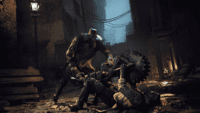Larry Fessenden is one of those names that when you hear has created something, whether acting, writing, or directing, you take the time to pay attention. Whether it’s starring in Ted Geoghegan’s recent Shudder release Brooklyn 45, appearing in Martin Scorsese’s upcoming Killers of the Flower Moon later this year, or writing, directing, producing, and editing his Fantasia International Film Festival premiere movie Blackout, Fessenden is having an incredible 2023.

After a horny hack n’ slash opening, Blackout resets on Charley (Alex Hurt), an artist working out of a motel who’s decided today’s the day he’s going to leave town. He packs up his belongings, tips the cleaning staff, and leaves a painting on his way out, but not before the grisly murders from the cold open get called back. A land developer, Hammond (Marshall Bell), is calling for the arrest of the eyewitness, Miguel (The Leech’s Rigo Garay), an immigrant worker convinced that he committed the murders. Alex sticks up for Miguel, but the rest of the town has become polarized with the politics surrounding Hammond’s proposed project, and the developer’s racist overtones become a further dividing line for the small town.
Charley seems to be on his way somewhere but has to make some stops first, essentially beginning the farewell tour as he puts the town in his rearview. The visits are to Hammond to tell him to lay off Miguel, a lawyer (Suitable Flesh’s Barbara Crampton) whom he wants to go through his late father’s, Hammond’s lawyer, files to catch the developer in something shady, and to his ex-girlfriend Sharon (Addison Timlin) who happens to be Hammond’s daughter. Unfortunately, Charley’s goodbyes run a little too long, and as the full moon rises before he can get to where he’s going, the audience sees what Charley has come to suspect: Charley is a werewolf.
From the start of the film, Charley is a likable character, finding himself on the right side of the upstate New York town’s issues. Still, there’s constant suspicion on the part of the audience, particularly if you knew what Blackout was about before the film started, about when the film will switch its tempo. Being that most Fessenden fans were alerted to Blackout being his final installment in a pseudo-trilogy featuring classic monsters, and the synopsis outright tells us that a painter is convinced that he’s a werewolf, any shot at a surprise becomes lost.

Honestly, Blackout was not the movie I was expecting. The first half of the movie aligns itself with apocalypse films like These Final Hours or How It Ends, where the main character goes around and makes peace with his last day on Earth. There are also moments where the film shifts into philosophical ideas with Waking Life or Scenes from an Empty Church conversations taking place. A scene with the town’s preacher feels extremely metaphoric as he proclaims, “A house divided against itself cannot stand,” while Charley wrestles with his own dual nature, and the town becomes a microcosmic representation of the United States. Fessenden injects horrific blood and gore scenes throughout, but it isn’t until the last act that the movie becomes a more standardized horror film.
The inimitable style is completely Fessenden, along with some themes he’s reused. To understand Blackout, you need to go back to the first entry in Fessenden’s trilogy. The 1995 film Habit follows an alcoholic and somewhat artistic bohemian New Yorker who’s recently lost his girlfriend while coping with the sudden loss of his father. Fessenden plays that role himself in the nearly thirty-year-old film while, in Blackout, Alex Hurt’s Charley has much of the same going on. It’s a far more nuanced version compared to Habit’s Fessenden declaring he’s “committing suicide on the installment plan,” as Fessenden’s character does in Habit. The alcohol aspect of Charley in Blackout is a little more embedded. Yet, we see the effects of his inner beast emanating from situations where alcohol is a factor on multiple occasions. Even the title Blackout seems to speak to an underlying hint.
Blackout does feel a little like a rehash of Habit, but it has been almost thirty years, and it seems fitting for Fessenden to revisit the film for this final installment in his trilogy. While the fear of death presides heavily over both characters, the differences in how they deal with their issues is where the film deviates. Blackout doesn’t lean into sex the way Habit does but instead into the beauty that makes life worth experiencing. The socio-political arc of the film, which rests in the divided residents, becomes secondary to Fessenden’s musings on art, friends, nature, and love. The qualities that unite us and elevate humans out of the animal world in a society where civility has ceased, and animalistic passions have driven us into like-minded packs.

People will notice the small tribute to Alex Hurt’s father, the late great William Hurt, in a small but tender moment within the film. Fessenden also dedicated Blackout to his father, and with the film’s ending linking to the middle film in his trilogy, Depraved, we get a hopeful moment about meeting those we’ve lost again someday.
I did say that Blackout wasn’t what I expected, but that doesn’t mean I didn’t enjoy it. The story is exceptionally woven together and told uniquely, while the pace and payoff are engaging and enjoyable. As a werewolf tale, a subgenre that I believe has more bad entries than good ones, I think it’s a well-needed change from how these stories are often told, modernizing the monster to fit a society viciously vitriolic with teeth and claws of their own. The practical effects make do with the film’s limited budget, and a few genuine scares are packed into the film thanks to Fessenden’s patience behind the camera. Also, Will Bates’ score is something I want in my vinyl collection as soon as possible.
But the movie’s greatest strength lies in its characters, who turn the small town into a believable community. Alex Hurt is just charming as hell and has a clear future in landing leading man roles, imbuing Charley with a transcendent likeability that translates through the sincerity of his smile. Blackout also has a superb supporting cast from Joseph Castillo-Midyett and Addison Timlin to the more seasoned cameo appearances of Joe Swanberg, James Le Gros, Kevin Corrigan, and the aforementioned Crampton and Bell.
Blackout screened as a part of the Fantasia International Film Festival on July 20. Festivalgoers can buy tickets for the encore screening on July 27. To keep up with the film’s release, refer to Blackout’s page on the Yellow Veil Pictures website.



